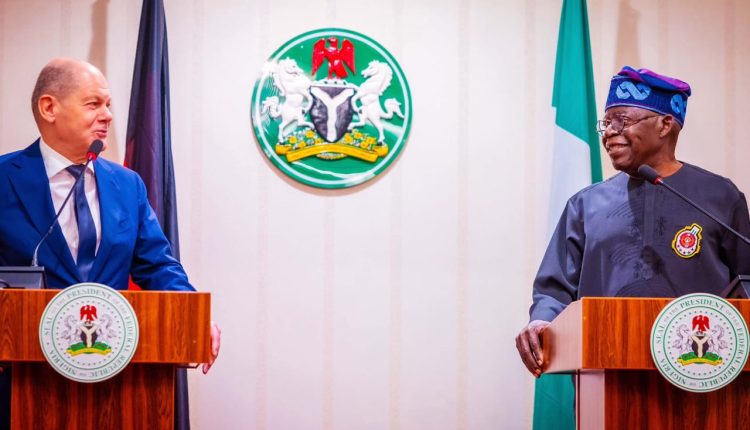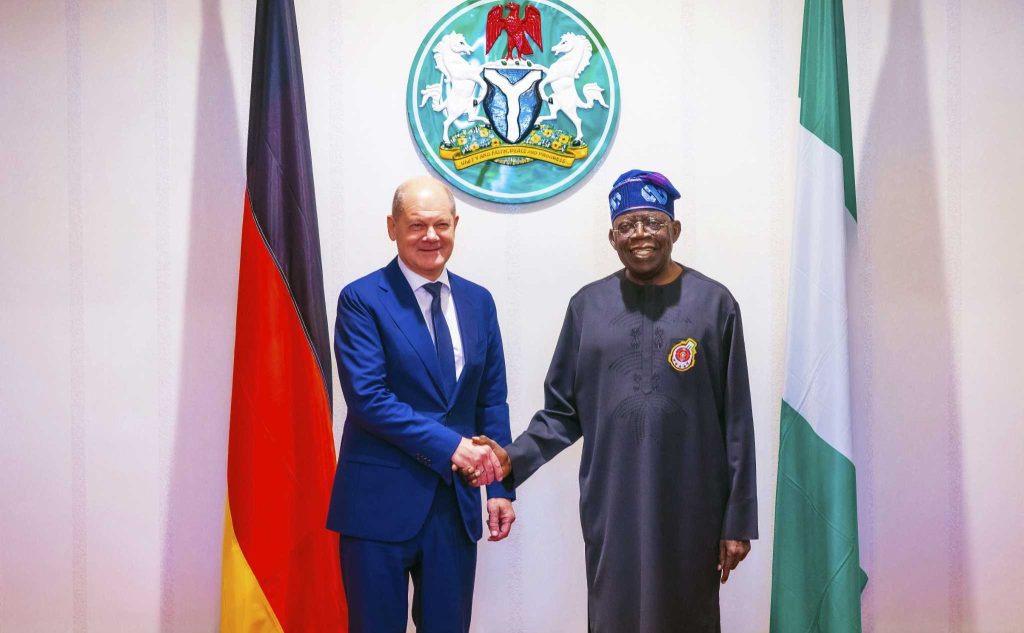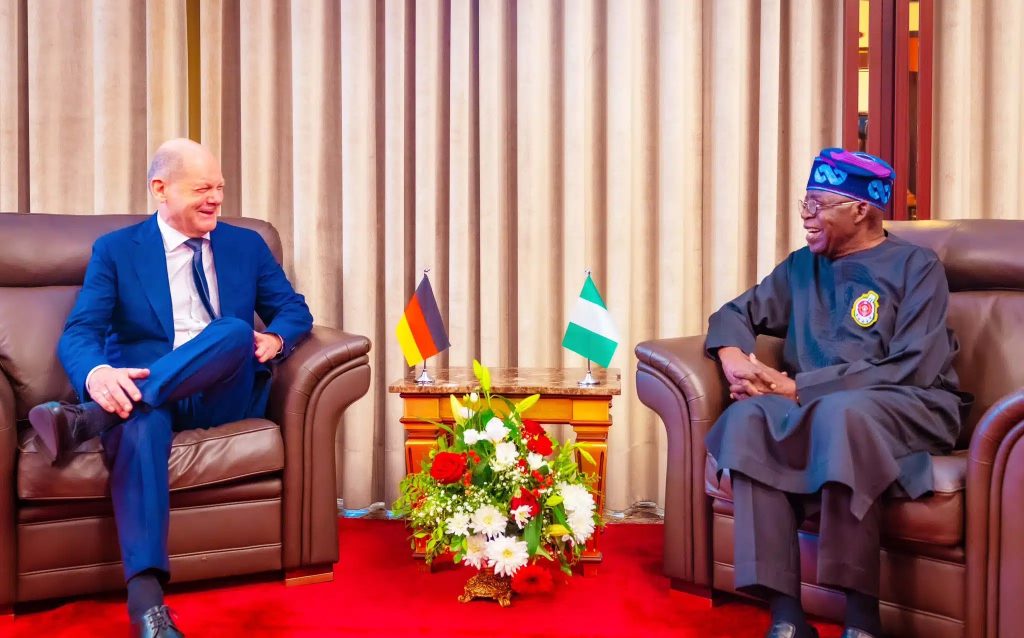
Scholz seeks Nigeria energy and migration partnerships
… Stresses Nigeria’s importance in a multipolar world will continue to grow
Chris Uba


German Chancellor Olaf Scholz is visiting Nigeria as part of a three-day visit to West Africa. Part of his mission is to agree an energy partnership to diversify Germany’s energy sources. Another is tackling migration.
The German chancellor continued his visit to Nigeria on Monday in an effort to deepen ties with the African continent’s most populous country.
Scholz called for a closer partnership with Nigeria when it came to managing migration, including the repatriation of Nigerians who did not have the right to stay in Germany.
The Chancellor also spoke of potential cooperation between the two nations on energy as Germany looks to diversify its sources of natural gas.
The German chancellor proposed expanding migration centres in Nigeria to support returnees from Germany. Scholz said the centres could also be used to advise skilled workers to become established in Germany.
“This requires some preparation and investment — on both sides,” Scholz said, adding that he had spoken about the issue with Nigerian President Bola Tinubu on Sunday
“I am convinced that this is another area where we can exploit enormous potential arising from closer cooperation between our two countries and between our two continents,” Scholz said, speaking at an economic forum in the coastal city of Lagos on Monday.
Tinubu has said he supports the repatriation of migrants, provided that they are Nigerian.

Proving this might be the most difficult part of the scheme because their identity cannot be established.
Of almost 14,000 asylum seekers from Nigeria obliged to leave Germany, some 12,500 are allowed to stay mostly because they have no identity papers.
In an interview published before the trip, which will also include a visit to Ghana, Scholz revealed that he was seeking to import natural gas from the country, which is also Africa’s largest economy.
“Nigeria has the biggest gas supply in Africa,” Scholz told the Nigerian daily The Punch. “German companies are interested in gas deliveries from Nigeria and look forward to cooperation with Nigerian gas companies.”
While Germany already imports large quantities of crude oil from Nigeria, it does not import gas.
The chancellor said Berlin was also exploring “joint initiatives to ramp up the hydrogen market,” with hydrogen expected to play an important role in meeting future energy needs.
But with the hydrogen market still underdeveloped and Germany no longer being supplied natural gas by Russia, the importing of liquefied natural gas (LNG) has taken on a greater significance.

Nigeria has emerged as an option for Germany, with Norway now Germany’s main supplier of LNQ.
“Nigeria has an ambitious plan for the energy transition,” Scholz said at an economic forum in Lagos on Monday. “And you are also well positioned to remain a key player for renewable energy and hydrogen — as well as for liquefied natural gas, which we will continue to need in the coming years until the hydrogen market is fully established.”
The German chancellor also pointed out that there was potential for greater cooperation and investment between the two countries in other sectors.
“This applies to a variety of sectors, ranging from infrastructure and energy to agriculture business, mineral resources, information and communication technologies, transport and logistics, and beyond,” he told The Punch.
Scholz also pointed out that Nigeria was Germany’s second-largest trading partner in sub-Saharan Africa, with direct German investments in Nigeria amounting to €150 million ($158 million) in 2021.
Scholz has said Germany ought to expand support for Nigeria’s military and the police when it comes to the fight against Islamist terror groups such as Boko Haram, which operates in the north-eastern part of Nigeria.
The extremist group carries out bloody attacks against civilians and has increasingly taken control of swaths of territory.
Nigeria has emerged as one of West Africa’s most stable democracies since the end of a military dictatorship in 1999.
Scholz said Nigeria’s influence on the global stage will continue to grow, just as he highlighted the growing relationship between the European superpower and the African powerhouse.
Addressing the Nigerian-German business community in Lagos on Monday, the German leader said bilateral trade between both countries stood at €3 billion, with about 90 German firms operating in Nigeria.
“Regardless of the geopolitical challenges we are currently facing, the importance of Nigeria and of the African continent as a whole will only continue to grow in this multipolar world.
“This must be reflected in international governance and policy-making.
That is why it is good news that the G20 finally admitted the African Union as a new member.
“In all of this, Nigeria and Germany stand shoulder to shoulder. Our partnership is rooted in trust and respect.
It is at the same time forward-looking and in flux,” he said.
Scholz expressed the importance of Africa in his foreign policy saying, “This is my fifth visit to Africa since taking office less than two years ago.
“The reason I keep coming back is simple. Our European story about Africa and about countries such as Nigeria has been a single story for way too long.
You all know the stereotypes that come to mind.
“But I am convinced that we can change that single story together. And that we can add more accurate, timelier chapters to it.
“Our new story begins with a somewhat basic observation: Today’s world is multipolar.”
He zeroed-in on Lagos, describing it as one of the largest and fastest-growing cities in the world, as well as the economic powerhouse of Africa’s most populous country, with an inspiring tech and cultural scene and remarkable business opportunities.
Scholz pushed for more cooperation between Nigeria and Germany, and painted a picture of a future pregnant with positive possibilities.
“The story I would like to offer you instead is one that blends Nigerian and German potential.
“A story of growth that is mutually beneficial. A story in which Africa and Europe choose a joint approach in fields such as energy, clean industrial development, green technology, vocational training, legal migration.”
Speaking further on why Nigeria and Germany should collaborate more he said:
“Nigeria is the most populous country on the African continent with its largest economy. Germany is the most populous country within the EU with the largest economy on the European continent.
“Already, Nigeria is our second-largest trading partner in sub-Saharan Africa.
“Last year, bilateral trade stood at €3 billion, chalking up a significant increase compared to previous years.
“About 90 German companies are present in Nigeria. I am glad to see many of them and their Nigerian partners and representatives here today.”
DW ,rc/rt (AP, dpa) ,Arise News



